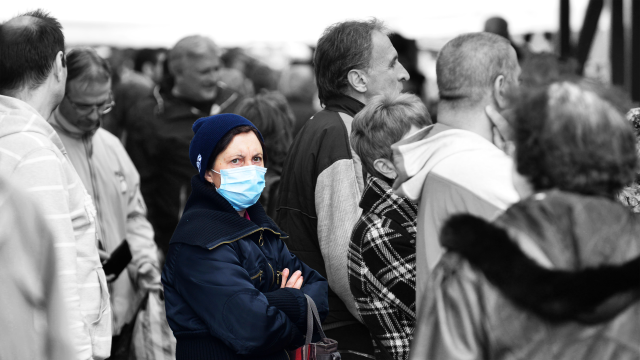A recent study of mask wearing in Denmark is being shared as if it proves that masks don’t protect us. That’s not what the study actually says.
I’ll get into the specifics below, but right now I’d like to point out a couple lines from the paper itself:
The most important limitation is that the findings are inconclusive…
and
It is important to emphasise that this trial did not address the effects of masks as source control [protecting others from the wearer] or as protection in settings where social distancing and other public health measures are not in effect.
So if you’re sharing this study to support your previously held opinion that masks are stupid and you don’t want to wear one, please stop. Now, let’s see what the study was actually about.
What question was the study designed to answer?
The newly published study, titled Effectiveness of Adding a Mask Recommendation to Other Public Health Measures to Prevent SARS-CoV-2 Infection in Danish Mask Wearers, was conducted in Denmark in April and May of this year.
The study setting wasn’t very much like the world we’re living in now. Cases were low, and most people were not wearing masks. The country was relying on social distancing as their main way of slowing the spread of COVID-19, with a lockdown that began in March and continued through May.
The question was: if we mail people a box of masks and tell them to wear the masks, will the people with the masks have a drastically reduced risk of becoming infected? The study was not blinded, because obviously you know whether you are wearing a mask. Participants tested themselves for antibodies and reported on a survey whether they had worn the masks according to instructions.
What did they find?
The investigators did not see the drastic reduction in infection they were hoping for. Both groups — those who were mailed a box of masks and those who were not — ended up with roughly similar rates of infection.
Did they see a small reduction in risk? Impossible to say. The study was powered, in the statistical sense, to detect a 50% reduction in infections between the mask group and the control group. If masks reduced risk by a lower amount — 25%? 10%? — the study wasn’t able to detect that.
That’s why the main finding of the study was reported as being anywhere from a less-than-50% decrease to possibly even an increase in infection. That’s a large range of possibilities because the study wasn’t designed to tell the difference between any of them.
“Bottom line – you wearing a mask probably won’t halve your risk of infection. But it might reduce it by 20%, and across an entire country experiencing a massive epidemic, that adds up,” says epidemiologist Gideon Meyerowitz-Katz of the University of Wollongong.
What it didn’t find
The study did not ask what happens if most people around you are wearing masks and you choose not to. (Mask wearing was uncommon in Denmark at the time.)
The study did not ask what happens if you go about your life, shopping and socialising, without a mask. (Denmark was in lockdown during most of the study.)
The study did not test a country-wide mask mandate (again, there was none).
The study did not test whether masks prevent you from spreading the coronavirus if you are sick. (It only looked at the infection risk for the wearer.)
The study did not test masks directly, only what happens when you advise people to wear them. (As Vinay Prasad wrote in MedPage Today, “A cake is both the batter and the temperature of the oven, and a public health recommendation is both the recommendation itself and whether people follow it.” This study did not separate the two.)
As the CDC recently clarified, we have other evidence that masks probably benefit the wearer. The Danish study adds to our knowledge by telling us not to expect masks to have a huge benefit for the wearer. It also serves to remind us that people don’t always follow recommendations; participants in the study had to report whether they wore the masks as recommended and only about half said that they had followed instructions exactly.
“It is not correct to say that masks failed, or are useless, based on this study,” Meyerowitz-Katz says. He points out that mask mandates might still have a “great benefit to society” even if the benefit to any individual is small. We kind of already knew that, didn’t we? Keep wearing your mask.

Leave a Reply
You must be logged in to post a comment.